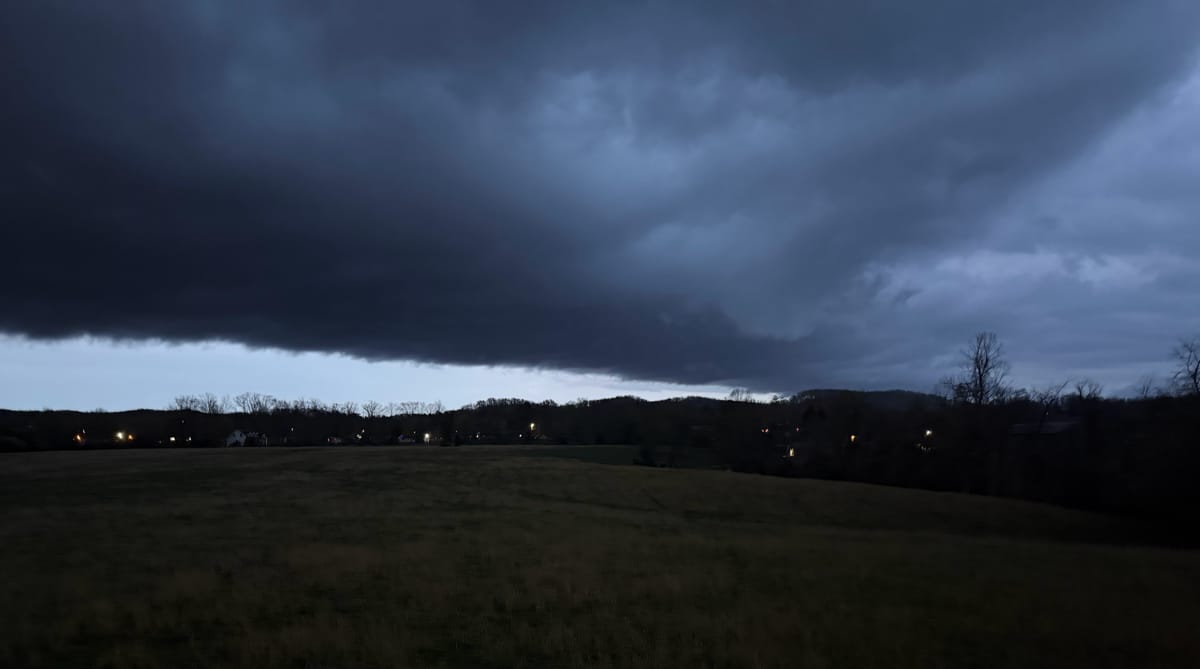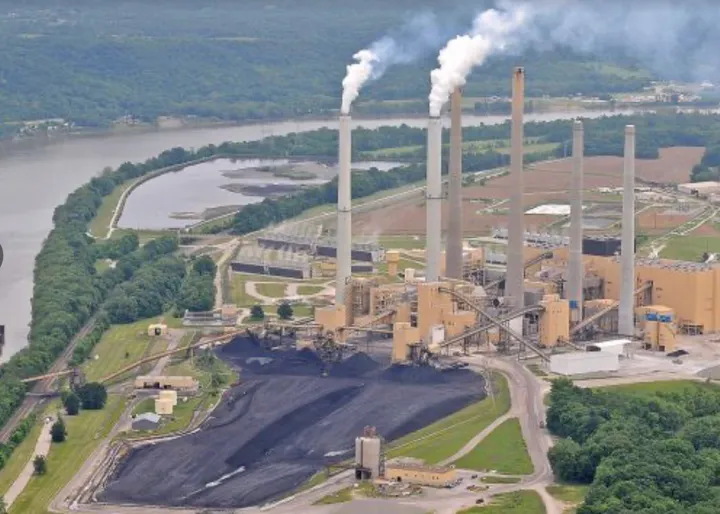There's been a change in the weather service
Overhauls to the National Weather Service are impacting how Kentuckians access weather emergency information

WASHINGTON, DC—The National Weather Service is in flux. Some even say it's in trouble, as it faces the impact of federal lay-offs, budget cuts, competition, a government shutdown, and possibly a sell-off of its satellite technology to private companies rather than continue the tax-payer funded National Oceanic and Atmospheric Administration, the NWS's parent group, to operate it.
The Trump administration is not the first to consider privatizing the NWS. Discussion about it has been bandied about in Congress at least as far back as the Reagan administration. In 2005, Sen. Rick Santorum, (R-PA), proposed a bill requiring the NWS to charge for its services. But this is the first time in recent memory the NWS has been politicized while also taking several hits.
For forecasters and others who rely upon the NWS's research and daily dispersal of weather data, such changes could dramatically change how the public learns of dangerous weather.
Justin Logan, chief meteorologist at Fox56 in Lexington, told The Edge in an interview, that "So far, there hasn't been anything that has been cut that has affected our day-to-day work."
But, he added that, "It's important to know what the Weather Service offers us. They are our partner, and all the data they offer us is something that we do look at daily–current conditions, information from weather balloons, weather models, it's all important to us for making our daily forecast, especially for warnings during severe weather."
Lay-offs
Chief among the stressors affecting the NWS now are drastic staff cuts mandated by the non-official Department of Government Efficiency, and the Voluntary Early Retirement Authority, according to Tom Fahy, the Washington-based legislative affairs director for the NWS Employees Organization.
"Thanks to Elon Musk and VERA, your weather service office in Jackson, Kentucky has over a 40% vacancy rate," Fahy told The Edge in an interview. "Under Biden, it was at an 18% vacancy rate."
Fahy said that there should be 11 meteorologists at the Jackson office but now they are down to nine. Still, he said, "They are all doing their level best."
A call to the Jackson NWS office to get details on how the office is coping with the staffing cut went unreturned. An email was met with an apologetic referral up the chain to NOAA, which in turn was met with a message from the Public Affairs people to not bother attempting to reach anyone there because due to the shutdown, they wouldn't respond, at least not until the shutdown is over.
Budget cuts
Last month, the House Appropriations Committee finalized its Commerce-Justice-Science 2026 spending bill. It includes an amendment barring the administration from closing NOAA laboratories and university partnerships focused on extreme weather and climate disasters.
Kentucky's 5th District Congressman Hal Rogers (R), sits on the Committee.
"The deadly natural disasters in Kentucky, Texas and other states this year, have gravely reminded us that we must equip the National Weather Service with better emergency warning systems to keep the American people safe," Rogers said in a statement on his website.
In the spending package, the Committee added another amendment directing NOAA to advance research on early prediction and warning systems for flood disasters in rural areas, a nod to the deadly floods in Texas last year, and to maintain hurricane research and coral reef protection.
The White House, meanwhile, is calling for defunding NOAA and its OAR (Office of Oceanic and Atmospheric Research) program that investigates hurricanes, among other weather events, to the tune of $2.2 billion, accusing NOAA in a statement, of radicalizing the weather.
"NOAA scammed taxpayers by funding Columbia University for a project 'gender-responsive agricultural adaptation' in Guatemala and Mexico. Universities researching 'Equity Focused Community Engagement' received funding for diversity-focused assessments of neighborhoods under the guise of addressing climate change," reads the statement.
To learn whether Rogers explicitly supports OAR, and what impact OAR findings have on Kentucky, if any, and, per his statement, how he envisions implementing a better alert system in the Commonwealth, The Edge attempted to reach Rogers or his chief of staff. Over the course of two weeks, nearly a dozen calls and emails to his state and federal offices detailing the exact nature of this story to staff each time, all went unreturned.
"Hall Rogers is a hero," Fahy told The Edge in a sideline interview during a National Press Foundation-sponsored event in Washington. "He is a Republican willing to say no to this administration. He took that bad tornado you had in his home district personally," Fahy said. The Edge could not confirm this.
YouTuber competition
The Fujita Scale E-4 tornado that ripped through London and Somerset in May of this year, seemed to catch forecasters in the NWS's Jackson office off guard. Lively discussion on social media accuses the NWS of not warning residents of the danger in time to save lives. For their part, the NWS told the media it was fully staffed at the time, and had followed normal protocol.
Followers of the self-taught, Pikeville, Ky-based weatherman and YouTuber, Ryan Hall, however, claim he was first to call it a tornado and to warn people accordingly, minutes before the NWS did. Hall has nearly 3 million subscribers to his channel.
George Herbig, owner of Weather Now Kentucky, based near Elizabethtown, is also a self-taught weatherman and YouTuber, with about 150,000 followers across his social media channels. Herbig, who said he has been offering weather prediction for almost a decade, told The Edge in an interview that forecasting has gotten trickier since the staffing cuts at the NWS.
"There should have been a tornado emergency issued sooner,"Herbig told the Edge in an interview. "I was [broadcasting] live at the time and I was begging for them to upgrade the warning."
Like Logan at Fox56, Herbig said he would be hard pressed to provide forecasts without the foundational data provided by the NWS.
"It's insane because these people are already being stretched," Herbig said. "People think meteorology is just us sitting at a computer, but there are so many moving parts, especially for the National Weather Service. Someone's gotta issue the warnings. Someone's gotta be taking real time reports, someone's gotta go out there and sample the storm. They need to send up weather balloons. There are so many people that are needed, but as budgets got cut, that weather sampling went down, and I can notice the difference," Herbig said.
Herbig said his audience base is niche, focused on the little Kentucky towns and hamlets not often covered by the metro-area broadcast stations in Louisville and Lexington. "I also now-cast, not forecast. I tell my audience what is happening now and what they need to do about it," he said.
Weather for sale
Herbig said he is wary of speaking too much about his methods because being on the Internet exposes him to extreme levels of criticism–"People can make anything political," he said–but that he does wonder whether outsourcing too many of the NWS's functions will cause Americans to lose trust in the NWS entirely.
"What if it ends up that our weather information is controlled by another government?" he asked, noting the international trade for utilities. "So, you lose the trust of your people, but then are we also eventually going to make people pay for life saving information?
In a world already accustomed to paying for weather apps that often base their predictions on NWS data, then tweak it with proprietary fixes, how far is the leap to paying for emergency weather alerts?
"It's not that far a stretch," Fahy said.
Federal weather data was made freely available to all who might wish to use it during the Regan administration when, according to Fahy, "It was argued that weather data is public data because we, the government, collect it and so it needs to be shared."
Currently, private weather companies use the NWS foundational data, "manipulate it put their own particular spin on it, and create products that they sell," Fahy said in the interview. "That's fine. We want that information out there," he said.
If the NWS is sold, Logan presumed the fee would probably be rolled into the weather modeling service his network affiliate purchases. "That would be a question for someone above me, but our weather vendor would probably offer it as part of a package deal," he said.
There are existing private-public arrangements at the NWS, including with satellite companies and others. Were the NWS to be privatized, tax-payer funded satellite and other technologies would be handed over to private companies, possibly some of which already are under contract with the NWS.
In the case of a sale, just who would be the ones to raise the alarm in case of dangerous weather?
Currently, it's illegal for any private company to issue a national weather watch or warning, thanks to statutes arising from the Carter administration's migration of the Civil Defense Preparedness Agency into the Federal Emergency Management Agency which designates emergency alerts as a federal task.
Because of the government shutdown, the House Appropriations Committee's spending package calling for keeping NOAA and the NWS largely intact, sits in limbo. Even if it eventually finds its way out of the Capitol and into the Oval Office, Trump has the power to veto it. Meanwhile, a request for information is out there, asking if there is someone capable and willing to manage all our satellite assets.
This story was updated on Saturday, October 25, 2025, to include the word "competition" in the first paragraph.



